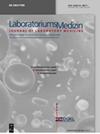Optimized short digestion protocol for free fetal DNA detection using methylation-dependent markers
IF 0.1
Q4 OTORHINOLARYNGOLOGY
Laboratoriumsmedizin-Journal of Laboratory Medicine
Pub Date : 2017-08-28
DOI:10.1515/labmed-2017-0016
引用次数: 3
Abstract
Abstract Background: Circulating free DNA (cfDNA) digestion with methylation sensitive restriction enzymes constitutes an important diagnostic tool for differentiating methylated from non-methylated DNA sequences. In the context of pregnancy, this is used to differentiate fetal from maternal DNA. Current protocols are of long duration and use multiple enzymes with different incubation and inactivating temperatures. We describe a short protocol for the digestion of circulating free DNA focused on its future adaptation to miniaturized microfluidic devices based on lab-on-a-chip technology. Methods: cfDNA was extracted from plasma samples of pregnant and non-pregnant women with chemagic Viral NA/gDNA and QIAamp circulating nucleic acids kits. For digestion protocol optimization, different methylation sensitive and insensitive restriction enzymes were used. Detection of RASSF1A, SRY and (β-actin) ACTB sequences was performed by real time polymerase chain reaction (PCR). Results: The digestion protocol is optimized to a 3.5 h one-step protocol using the enzymes BstUI, BstY1 and HhaI resulting in a complete digestion of the hypomethylated maternal RASSF1A with a limit of digestion of 3.65E10 gene copies. Conclusions: This work provides a digestion protocol for cfDNA samples with a combination of temperatures (37 °C and 60 °C) and a protocol length (<4 h) which facilitates its adaptation to miniaturized microfluidic devices based on lab-on-a-chip technology. In this technology, the shorter the duration of the protocol, the greater the rate of success and the less sample evaporation.利用甲基化依赖标记优化了游离胎儿DNA检测的短消化方案
背景:甲基化敏感限制性内切酶对循环游离DNA (cfDNA)的酶切是区分甲基化与非甲基化DNA序列的重要诊断工具。在怀孕的情况下,这是用来区分胎儿和母亲的DNA。目前的方案持续时间长,使用多种酶在不同的孵育和灭活温度。我们描述了一种消化循环游离DNA的简短方案,重点是其未来适应基于芯片实验室技术的小型化微流体装置。方法:采用化学病毒NA/gDNA和QIAamp循环核酸试剂盒从孕妇和非孕妇血浆中提取cfDNA。采用不同的甲基化敏感酶和不敏感酶进行酶切方案优化。实时聚合酶链反应(real - time polymerase chain reaction, PCR)检测RASSF1A、SRY和(β-actin) ACTB序列。结果:利用BstUI、BstY1和HhaI酶,将低甲基化的母体RASSF1A酶切至3.5 h一步完成,酶切限为3.65E10个基因拷贝。结论:本工作提供了一种温度(37°C和60°C)和协议长度(<4 h)的cfDNA样品消化方案,有利于其适应基于芯片实验室技术的小型化微流控装置。在该技术中,协议持续时间越短,成功率越高,样品蒸发越少。
本文章由计算机程序翻译,如有差异,请以英文原文为准。
求助全文
约1分钟内获得全文
求助全文
来源期刊

Laboratoriumsmedizin-Journal of Laboratory Medicine
MEDICAL LABORATORY TECHNOLOGY-
CiteScore
0.80
自引率
0.00%
发文量
1
审稿时长
>12 weeks
期刊介绍:
Information not localized
 求助内容:
求助内容: 应助结果提醒方式:
应助结果提醒方式:


